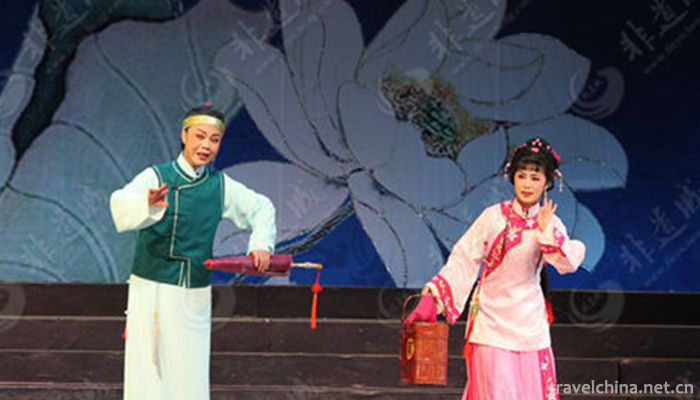Lake Opera
Huzhou Tanhuang, originally known as Huzhou Tanhuang, is a traditional local opera. It is mainly popular in Huzhou, Jiaxing, Yuhang and Linan of Hangzhou, Wujiang and Yixing of Jiangsu, Guangde of Anhui, etc. It has a history of about 100 years. Wuxing was named Huzhou Opera in 1951 because it belonged to Huzhou Prefecture. Huju opera has a strong water-village sentiment in the south of the Yangtze River. It is not only friendly and soft in language (singing in Huzhou dialect of Wu dialect), but also fresh and smooth in melody. It is also elegant and delicate in performance, and suitable for performing family love drama with joy and sorrow.
In June 2007, Hu Opera was listed in the second batch of representative works of intangible cultural heritage in Zhejiang Province.
On May 23, 2011, Huzhou City, Zhejiang Province declared "Huju Opera" which was approved by the State Council and listed in the third batch of national intangible cultural heritage list.
Inheritance and protection
Hu Opera is one of the local operas in Zhejiang Province and the only one in the northern part of Zhejiang Province. In its more than one hundred years of development history, Huzhou Opera has created many vivid and moving artistic images with its rich local features, repertoires and musical performances, reflecting the unique local customs of Huzhou area. After the founding of New China, a number of excellent dramas such as the ancient costume drama Kirin Belt, the newly written historical drama Great Wall Song and the modern drama Taihu Honglang have been created by the people in the Hu opera circle. These plays have been performed by Huzhou Huzhou Huzhou Theatre Troupe, making them present to the audience perfectly, thus satisfying and enriching people's cultural life. Since the 1980s, due to various factors, the performance of the opera has been depressed. Like other operas, the performance of the lake opera has encountered great difficulties. However, Huzhou Huzhou Drama Troupe still insists on creation and performance in its predicament. The troupe has created and performed modern operas such as "Taiping Bridge" and "Cave Variations" successively, and achieved good results in provincial and municipal drama festivals, which also has a certain influence in China. In 1992, at the invitation of the Ministry of Culture, the delegation also went to Fujian to participate in the excellent performance of "the first group in the world" organized by the Ministry of Culture, and won high praise. However, with the strengthening of market-oriented trend and the acceleration of modernization process, great changes have taken place in the cultural ecology of our country. Some cultural heritages relying on dictation and behavior are disappearing. Many traditional skills are on the verge of extinction. Traditional and diverse folk cultures have been strongly impacted by large-scale socialized production and foreign cultures. Affected by the overall social environment, Huzhou Huzhou Huzhou Drama Troupe withdrew in 2000 and Huzhou Drama was on the verge of extinction. Nowadays, most of the older generation of Lake opera artists are over the age of six or seventy, and the situation of aging and lack of successors is serious. It is urgent to protect and inherit the traditional culture of Hu Opera.
Hu Opera is a traditional cultural expression form and cultural space closely related to people's life, which is inherited from generation to generation. It is also a witness of historical development and an extremely important cultural resource. Therefore, the protection and inheritance of Hu Opera is particularly necessary for the construction of a large cultural province and a large cultural city, and for the protection and promotion of traditional culture.
On May 18, 2010, the Ministry of Culture of China announced the third batch of national intangible cultural heritage list of recommended projects (new entries). Huzhou City of Zhejiang Province declared "Huju Opera" as a non-material cultural heritage in the category of traditional drama projects.

0 Questions
Ask a Question
Your email address will not be published.